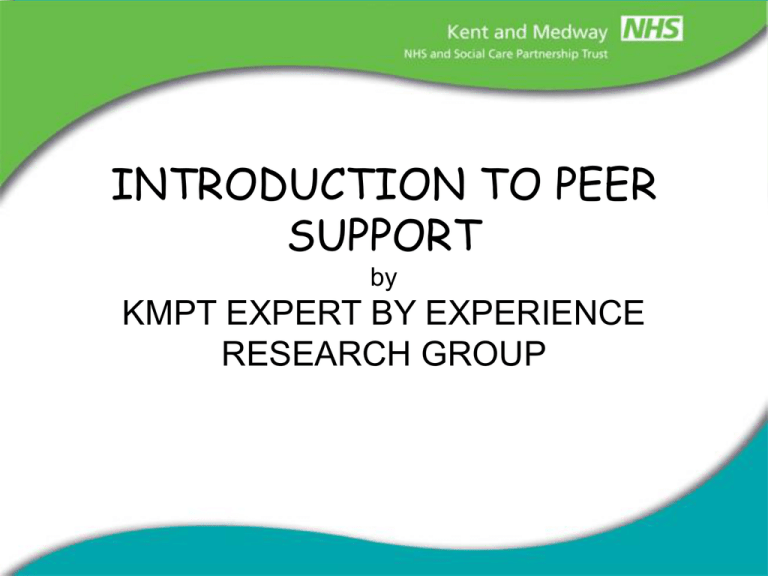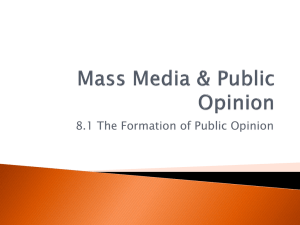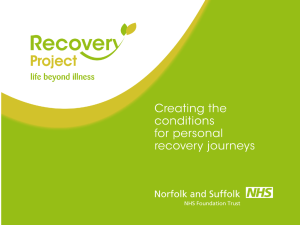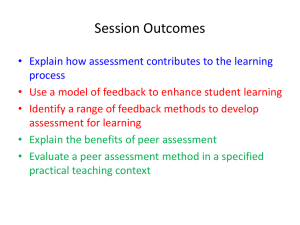Peer Support Worker - Kent and Medway NHS Payroll Services
advertisement

INTRODUCTION TO PEER SUPPORT by KMPT EXPERT BY EXPERIENCE RESEARCH GROUP WHAT IS RECOVERY? • A deeply personal, unique process of changing one’s attitudes, values, feelings goals, skills, and/or roles. It is a way of living a satisfying, hopeful and contributing life even with the limitations caused by illness. Recovery involves the development of new meaning and purpose in one’s life as one grows beyond the catastrophic effects of mental illness.” (Anthony, 1993). Recovery ‘There is hope, a vision of hope that includes no limits. That even when someone says to us, “You can’t do that because you have those symptoms dear!” we know it is not true… Those of us who experience psychiatric symptoms can and do get well.’ Mary Ellen Copeland. WRAP What is Peer support • ‘Peer support is a system of giving and receiving help founded on key principles of respect, shared responsibility, and mutual agreement of what is helpful. Peer support is not based on psychiatric models and diagnostic criteria. It is about understanding another’s situation emphatically through the shared experience of emotional and psychological pain.’ (Mead 2003) WHAT PEOPLE SAY ABOUT PEER SUPPORT • "Peer support offers something that can go beyond the professional support and therapy offered to people during crisis. Seeing a person who has been there, and is able to tell the tale of their own recovery, offers real hope to individuals who may not have any at that particular point in their life. Gwen Bonner - Nurse Consultant East Berkshire Inpatient Services Berkshire Healthcare NHS Foundation Trust WHAT PEOPLE SAY ABOUT PEER SUPPORT (cont) • “I am not a diagnosis, I am a human being and as such I am more important than my diagnosis. Peer Support sees the person first, understands their distress and can offer true solutions that the Supporting Peer has used themselves.” Peer Support Worker SOME TYPES OF PEER SUPPORT • Peer Support Groups • Recovery Groups • Peer Support Workers network, Depression Alliance What is a Peer Support Worker? • Someone with lived experience of mental health issues / mental illness • Someone who is employed specifically as a result of their experience • Someone who has the ability to share their recovery journey with others • Someone who can motivate and encourage others WHY DOES IT WORK? • "When people identify with others who they feel are ‘like them’, they feel a connection. This is turn fosters an environment where individuals can share suggestions and tips for their recovery with each other, and try out different strategies, with the support of their fellow peers." Shery Mead, 2001 INTENTIONAL PEER SUPPORT • One “formal” model of peer support developed by mental health survivor trainer, Shery Mead, New Hampshire, US Involves training in ways of relating to each other Doesn’t use diagnosis Purposeful - moving towards a different place and stepping out of current story Linked with wellness recovery action planning (WRAP) RECOVERY INNOVATIONS IN ARIZONA Gene Johnson - President and CEO • From Crisis Stabilisation to RECOVERY • One year after the Peer Support staff have began working in the two hospital facilities, there was, according to hospital administration: – a reduction of 36% in the use of seclusion – 48% reduction in the use of restraint, – 56% reduction in hospital readmission rates. PEER SUPPORT IN THE UK NOW • Scotland • England AND IN THE FUTURE • Peer support is an important component of efforts to make services more focused on recovery (Shepherd et all 2008). In the longer term, peer support could play a central role in striking a new balance in the mental health system between professional intervention and other forms of support For this to be possible, there will need to be considerable expansion in the number of peer supporters. (Perkins 2010). LEEDS SURVIVOR LED CRISIS CENTRE • The Leeds Survivor Led Crisis Service was set up as a place of sanctuary in 1999 by a group of service users as an alternative to hospital admission and statutory services for people in acute mental health crisis. The survivors who run it have developed their service based on their knowledge of what it feels like to be in crisis and what helps and does not help. • They believe that to deal with a crisis, a person must feel safe, listened to, and connected to other people. • It has won several awards for outstanding service. • Savings: cost per day of acute hospital inpatient is £259 cost per day at the Centre it is estimated at £178 Acknowledgements • Alex Williams: Valuing Peer Support literature review www.kmpt.nhs.uk/Downloads/Gettinginvolved/Valuing-Peer-support.pdf • Dr Jan Wallcraft • Patricia Ronan: senior nursing lecturer, Canterbury Christ Church University • Nick Dent: PALS officer • Fiona Venner: Leeds Survivor-Led Crisis Centre, for kindly supplying articles and information highlighting an outstanding service Further information • www.recoverydevon.co.uk • www.together-uk.org/uploads/pdf/ SUID/helpinghand.pdf • www.scottishrecovery.net/PeerSupport/peer-support.html • www.mentalhealthpeers.com/




